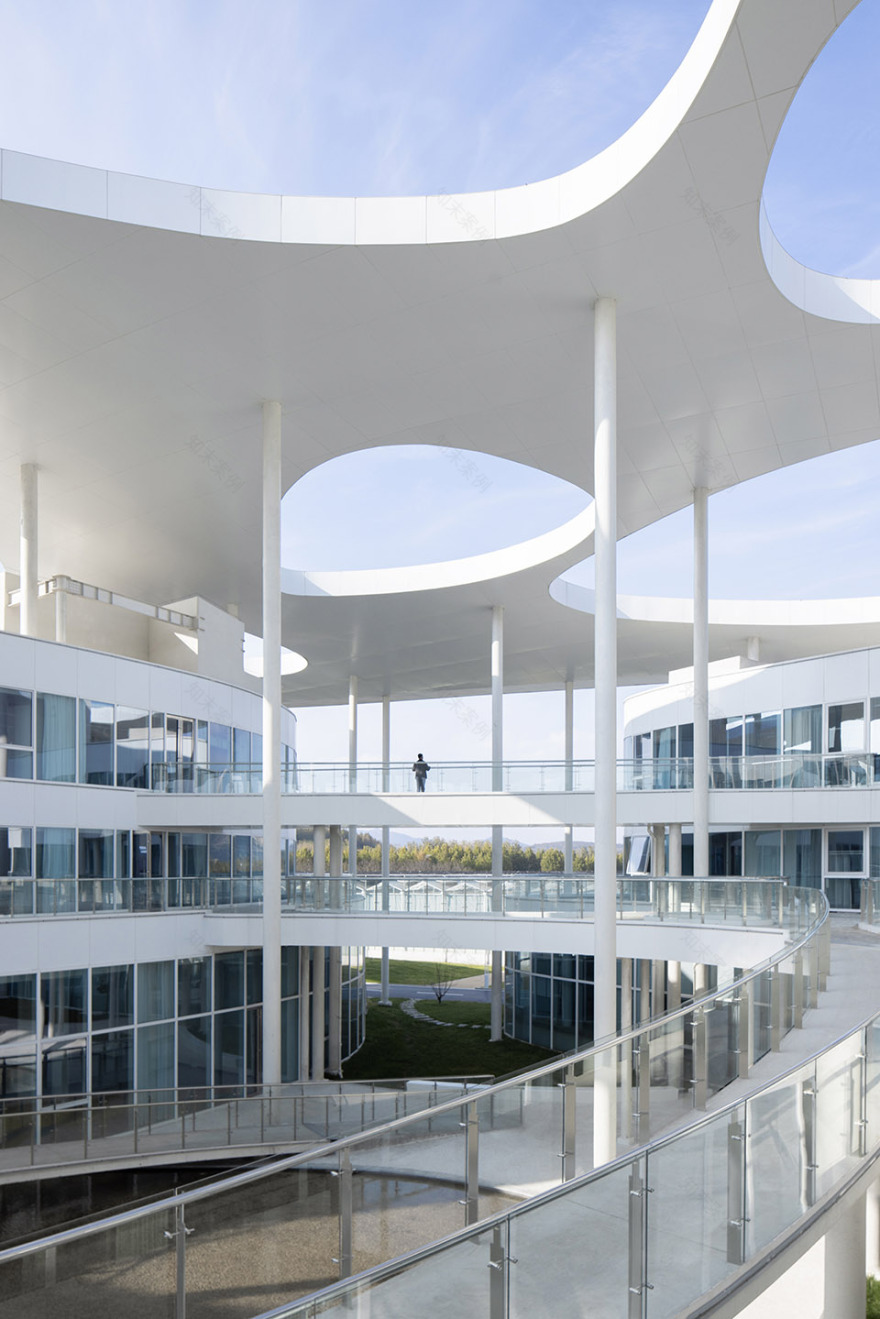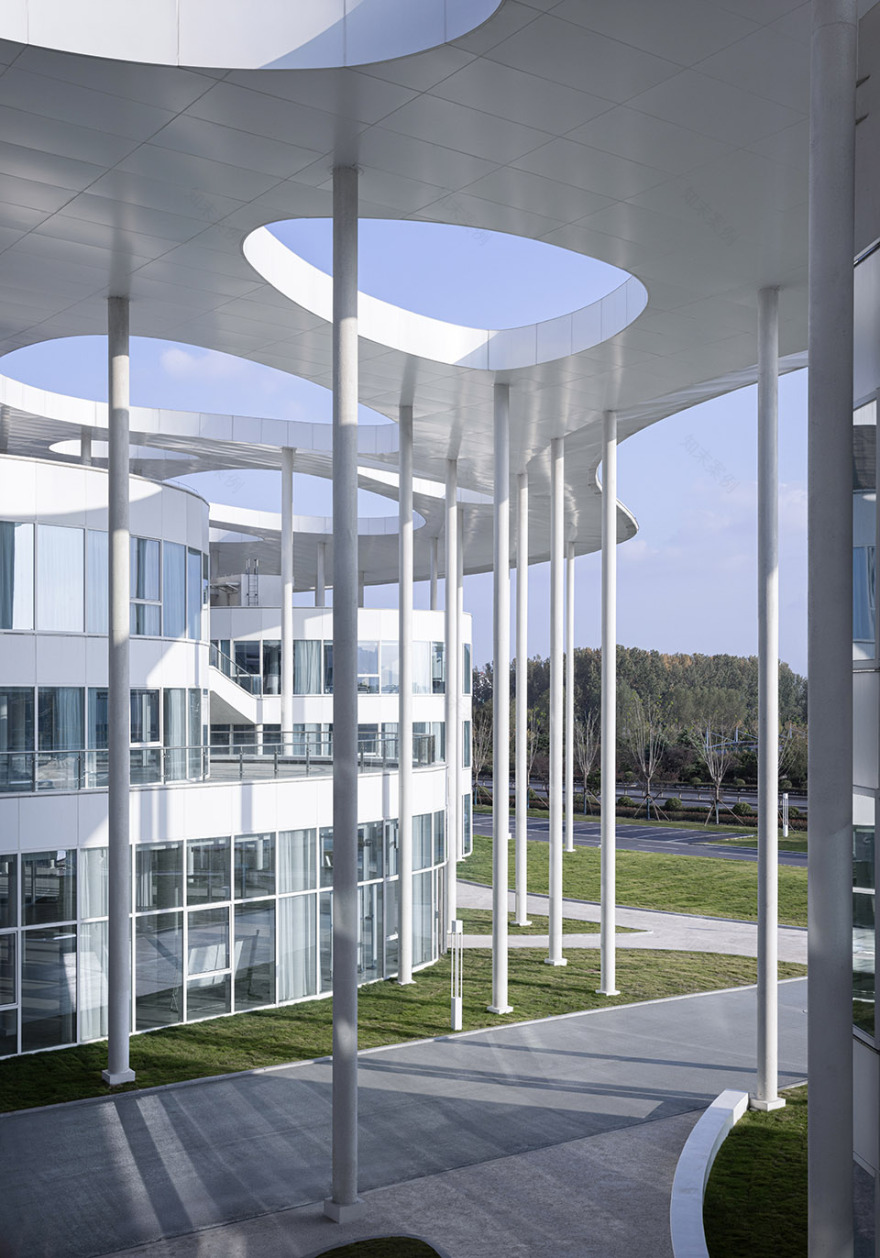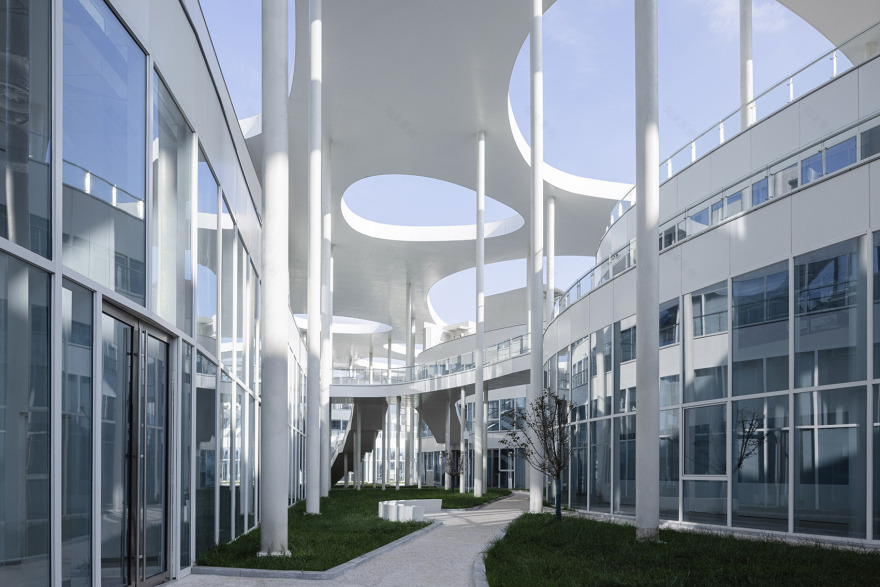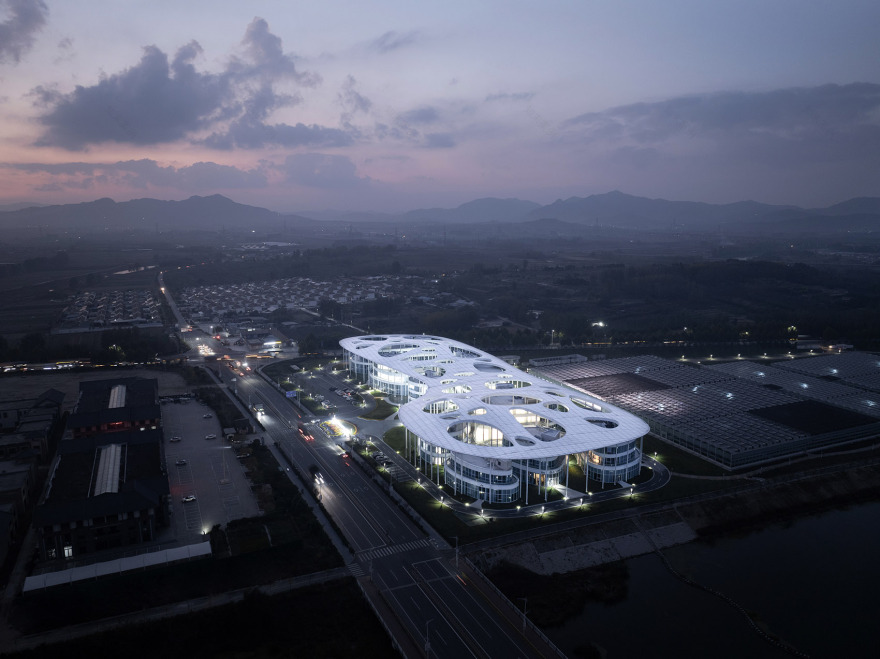查看完整案例

收藏

下载
茶叶可算得上神奇的叶子,既是生活必需品,也是文化载体。传统茶树生于南国,无法抵御北方的严寒和冰雪。上世纪 60 年代,山东开启了南茶北移实践,在临沂和青岛一带试种,历经近十年移栽成功,日照岚山巨峰镇成为北方绿茶最为集中的栽植区域之一,茶产业也成为整个镇的支柱产业。随着当地茶产业的发展,一个综合的以茶树培育研究和文化融合的园区配套建设势在必行。
©直译建筑摄影
Tea can be regarded as a magical leaf, serving as both a daily necessity and a cultural emblem. Traditionally, tea plants thrived in southern China, unable to withstand the freezing temperatures and snow of the north. In the 1960s, Shandong Province initiated the “southern tea migration to the north,” testing tea cultivation in Linyi and Qingdao. After nearly a decade of trials, this effort succeeded, establishing Jufeng Town in Rizhao’s Lanshan District as a key northern hub for green tea cultivation. The tea industry subsequently became the cornerstone of the local economy. As the industry grew, the need for a comprehensive facility integrating tea cultivation research and cultural activities became evident.
▼东立面远景鸟瞰,East ariel view ©直译建筑摄影
▼科创示范园西北透视,north-west view©直译建筑摄影
园区偏安乡镇一隅,背靠朝元山,紧邻巨峰河,场地内为露天和温室育苗基地及一座综合建筑。设计需在有限的土地上实现一个多种功能的建筑,主要功能包括茶叶生产厂房、会展中心、绿茶工坊、茶室、展销中心、电商中心以及服务于会展的酒店、特色餐厅、研学中心等配套。如何组织并协调不同的功能体块,让茶叶之乡的特色有机发生,“岛屿”成为建筑的切入点。岛屿式的建筑有机分布,成为生长的聚落。形式正如乡村和小型城镇聚落在乡村田园间有机生长。建筑师将整座建筑化解为九个“岛屿”,每个岛屿建筑功能独立,通过研究不同功能的需求,匹配建筑朝向和景观资源。
The park is nestled in a quiet rural setting, framed by Chaoyuan Mountain to the west and the Jufeng River to the east. It comprises outdoor and greenhouse nurseries and a multifunctional building. The design had to integrate diverse programs within a limited site area, including a tea production facility, exhibition center, green tea workshop, tea house, sales and e-commerce centers, and supporting facilities such as a hotel, specialty restaurants, and an educational research center. The challenge was to harmonize these varied functions while celebrating the identity of this tea-producing region. The concept of “islands” emerged as the design’s guiding principle, with buildings dispersed organically, akin to a growing settlement. This approach echoes the organic layout of rural villages and small-town clusters. The architects divided the structure into nine “islands,” each functionally independent and strategically oriented to optimize solar exposure and landscape integration.
▼科创示范园东侧沿河立面,East side elevation along the river©直译建筑摄影
▼科创示范园东侧沿河立面,East side elevation along the river©直译建筑摄影
▼科创示范园南立面,south elevation©直译建筑摄影
▼科创示范园东南立面,south-east elevation©直译建筑摄影
▼科创示范园东西院落中庭,courtyard©直译建筑摄影
建筑成为聚落
Architecture as a Settlement
建筑分为东西两大组团,西部组团以加工车间和电商为主,东部组团以会展和文旅体验为主。东北部的岛屿建筑临近巨峰河,环境僻静,对私密性和景观要求最高的酒店落位期间。其余功能区按生产要求组织。西北侧的岛屿建筑为厂房和电商组团,中部靠西的岛屿建筑定位为抹茶茶室,中部依次为会展中心、茶室和餐厅。西部组团布局紧凑,中间狭长谷地成为风景。东部组团围绕着一个圆形水景展开,环形坡道串联场地交通。
The project is divided into two primary clusters: the western cluster focuses on tea processing and e-commerce, while the eastern cluster centers on exhibitions and cultural tourism. The northeastern “island,” situated near the Jufeng River, offers a secluded environment, making it ideal for the hotel, which requires privacy and superior views. Other programmatic elements are organized based on operational needs. The northwest “island” houses the tea processing and e-commerce facilities, while the central western “island” functions as a matcha tea house. Progressing eastward, the islands include the exhibition center, tea house, and restaurant. The western cluster features a compact arrangement with a narrow, scenic valley serving as a central landscape. The eastern cluster is arranged around a circular water feature, with a ring-shaped ramp interconnecting the site.
▼科创示范园西立面,west elevation©直译建筑摄影
▼科创示范园东院中庭,courtyard©直译建筑摄影
建筑层高三层,通过二层环形外廊和三层连廊连接大部分建筑单体,让散落的岛屿建筑成为一个连续的户外步行空间和一个立体聚落。丰富的户外连通空间,让建筑的使用变得更加灵活多元,也为屋顶后期开发为游乐性空间提供可能,满足了文旅项目中可探索、可体验的需求。人们可以在建筑间随意游逛,去中心化的建筑也使人们参与体验建筑的过程随性而均等,半透明的玻璃幕墙也让建筑内外发生连续的对话。
The buildings are three stories tall, with the second floor featuring circular external corridors and the third floor connected by bridges, creating a continuous network of outdoor pathways. These connections transform the scattered “islands” into a cohesive, three-dimensional settlement. The extensive outdoor spaces enhance the versatility of the design, offering potential for future rooftop development as recreational areas—ideal for cultural and tourism activities. Visitors are encouraged to freely explore the spaces between buildings, while the decentralized layout fosters a casual and engaging experience. Semi-transparent glass curtain walls blur the boundaries between indoor and outdoor spaces, creating a dynamic interaction.
▼科创示范园东院中庭,courtyard©直译建筑摄影
▼科创示范园院落中庭,courtyard©直译建筑摄影
▼科创示范园建筑内部,indoor space©直译建筑摄影
自然与建筑融合的人间剧场
A Theater of Nature and Architecture
连绵不断的透光屋顶,将裁剪过的光线、雨水引入到岛屿和岛屿间,为屋顶花园和岛屿建筑间的绿地森林提供阳光和降水。岛屿建筑之间形成自然风廊,带来山水田园间流动的空气,也为夏天带来凉爽。带有孔洞的屋顶,随太阳的角度变化将变幻丰富的光线带入建筑,捕捉一天中的光线变化,云朵屋顶也成为时间的容器。
The translucent roofs allow filtered light and rainwater to permeate the spaces between the islands, supporting rooftop gardens and green spaces. Natural ventilation corridors channel fresh air from the surrounding landscape, cooling the site during summer. The perforated roofs, designed to cast dynamic light patterns that shift with the sun’s movement, create a captivating play of light and shadow, embodying the passage of time. These cloud-like roofs become symbolic vessels of time and nature.
▼科创示范园二楼退台,stepped terrace©直译建筑摄影
▼科创示范园东西院落中庭,courtyard©直译建筑摄影
支撑云洞屋顶的白色钢柱如一棵棵直立的树,形成一片白色的森林,阳光打下来又是一片光之森。岛屿建筑之间的绿地森林逐渐生长成形,将与岛屿式的建筑相融合,真正成为一片自然的“岛屿建筑”。
White steel columns, reminiscent of slender trees, support the perforated roofs, forming a “forest of light” when sunlight filters through. Over time, the green spaces between the islands will flourish, integrating seamlessly with the architecture and completing the vision of a natural “island” landscape.
▼白云状镂空屋顶,cloud-shaped penetrated roof©直译建筑摄影
▼科创示范园东院中庭坡道,courtyard ramp©直译建筑摄影
一座建筑如同一个剧场,是一个屋檐下的小世界。开放而自由的建筑设计,预示着乡村开放且透明的未来,乡村和自然对人们的包容是其内在价值所在。设计师也希望整座建筑成为一个开放式的剧场,上映的是乡村的人间喜剧。
This project embodies the idea of architecture as a theater—a microcosm beneath a single roof. Its open and flexible design signals a transparent and inclusive future for rural areas, where the intrinsic values of nature and community are celebrated. The architects envision the entire complex as an open stage, where the everyday joys of rural life take center stage.
▼夜景鸟瞰,Ariel view at night©直译建筑摄影
▼夜景鸟瞰远景,Ariel view at night©直译建筑摄影
▼规划总平面图,site plan©孔祥伟工作室
▼屋顶平面,roof plan©孔祥伟工作室
▼立面图,elevation©孔祥伟工作室
项目地点:日照市岚山区巨峰镇
项目业主:日照市岚山省级农业高新技术产业开发区
建筑面积:2.2 万㎡
建筑方案设计:孔祥伟工作室
主持建筑师:孔祥伟
设计团队:李国栋、许多、崔峻、高灼见
甲级设计单位:北京中外建建筑设计有限公司
地方设计单位:日照建筑设计研究院有限公司
结构设计单位:山东大卫国际建筑设计有限公司
施工总承包:中国建筑第三局
设计时间:2022 年—2023 年
施工完成时间:2024 年
Project Location: Jufeng Town, Lanshan District, Rizhao City
Client: Lanshan Provincial Agricultural High-Tech Industrial Development Zone, Rizhao City
Gross Floor Area: 22,000 square meters
Architectural Design Concept: Kong Xiangwei Studio
Principal Architect: Kong Xiangwei
Design Team: Li Guodong, Xu Duo, Cui Jun, Gao Zhuojian
Grade-A Design Institution: Beijing CCI Architectural Design Co., Ltd.
Local Design Institution: Rizhao Architectural Design Institute Co., Ltd.
Structural Consultant: Shandong Dawei International Architectural Design Co., Ltd.
General Contractor: China Construction Third Engineering Bureau
Design Period: 2022–2023
Construction Completion: 2024
客服
消息
收藏
下载
最近











































